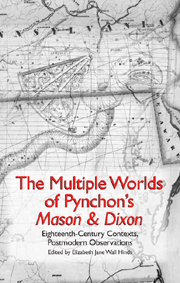 The Multiple Worlds of Pynchon's 'Mason and Dixon'
The Multiple Worlds of Pynchon's 'Mason and Dixon' from Enlightenment Microhistories
Published online by Cambridge University Press: 12 September 2012
MADNESS AS BOTH A BLANKET DESCRIPTION for a host of abnormal mental states and the way in which these states are perceived by the sane, has been a recurrent presence in Pynchon's work throughout his career. His fiction of the 1960s and 70s established a particularly powerful and enduring association with paranoia, while Pynchon's novel, Vineland (1990), saw Zoyd Wheeler struggling to assume a post-radical state of socialized normalcy in the Reagan era through receipt of a “mental disability check.” The novel opens with Zoyd contemplating the fact that “unless he did something publicly crazy before a date now less than a week away, he would no longer qualify for benefits” (3). Abnormal mental states, sometimes even madness, become identified with the sea in Pynchon's novels beginning with The Crying of Lot 49 and reaching a novel-length thematic in Mason & Dixon. The symbolic identification of madness and the sea that Pynchon plays upon is in part informed by romanticism and concepts of the sublime, in which the spectacle of nature offers man a means of affirming the interconnection between selfhood and Godhead. But more influential is a longer and specifically American tradition that Pynchon is well aware of and subsequently brings to the fore in Mason & Dixon, a tradition linking madness, divine election, and national selfhood.
To save this book to your Kindle, first ensure [email protected] is added to your Approved Personal Document E-mail List under your Personal Document Settings on the Manage Your Content and Devices page of your Amazon account. Then enter the ‘name’ part of your Kindle email address below. Find out more about saving to your Kindle.
Note you can select to save to either the @free.kindle.com or @kindle.com variations. ‘@free.kindle.com’ emails are free but can only be saved to your device when it is connected to wi-fi. ‘@kindle.com’ emails can be delivered even when you are not connected to wi-fi, but note that service fees apply.
Find out more about the Kindle Personal Document Service.
To save content items to your account, please confirm that you agree to abide by our usage policies. If this is the first time you use this feature, you will be asked to authorise Cambridge Core to connect with your account. Find out more about saving content to Dropbox.
To save content items to your account, please confirm that you agree to abide by our usage policies. If this is the first time you use this feature, you will be asked to authorise Cambridge Core to connect with your account. Find out more about saving content to Google Drive.